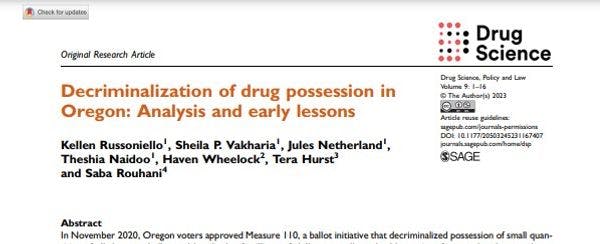Decriminalization of drug possession in Oregon: Analysis and early lessons
In November 2020, Oregon voters approved Measure 110, a ballot initiative that decriminalized possession of small quantities of all drugs and allocated hundreds of millions of dollars annually to health services for people who use drugs. Implementation of Measure 110 is ongoing, but several effects are noticeable in the first two years since the measure passed. Among these are substantial decreases in possession of controlled substances arrests and an infusion of funding into harm reduction services that have not traditionally enjoyed a sustainable funding source. This paper analyzes the provisions of Measure 110, examines its early impacts, successes, and challenges, and outlines lessons that jurisdictions contemplating decriminalizing drug possession in the U.S. and globally should consider.
As more people view substance use as a health issue rather than a criminal legal issue, drug policies based on criminalization and punishment have drawn increased criticism around the world. Support for decriminalization – where drug possession for personal use remains prohibited but is not subject to criminal penalties – is gaining significant ground. Drug possession has been decriminalized in Portugal for over two decades, and they are often held up as an example of how decriminalizing drug possession and investing in health services can produce significant societal benefits, including reduced rates of communicable disease transmission and overdose and increased harm reduction and treatment utilization (Slade, 2021). The United Nations committed to promoting alternatives to criminal responses to drugs, including decriminalization, in 2018 (United Nations System Chief Executives Board for Coordination, 2019). Major public health organizations support decriminalizing drug possession, including the American Public Health Association and the Global Commission on Drug Policy (American Public Health Association, 2013; Drug Policy Alliance, 2017; Global Commission on Drug Policy, 2018).
The United States is globally recognized as the primary proponent of the war on drugs, arresting more people annually for drug offenses than any other country (Sunrise House, 2019). Yet, individual states have already departed from a strict prohibitionist approach. Twenty-one states and the District of Columbia, the nation’s capital, have legalized cannabis possession for recreational purposes by adults aged 21 or older, and many more have expanded medical access and/or decriminalized personal possession of the drug (Berke et al., 2022). The voters of the state of Oregon expanded drug policy reform beyond cannabis and decriminalized the personal possession of all drugs when they approved Measure 110, the Drug Addiction Treatment and Recovery Act, in November of 2020 (Measure 110 Drug Treatment and Recovery Act 2019 (Or.)). This first-of-its-kind reform in the U.S. eliminates criminal penalties for possession of all drugs within certain limits and invests hundreds of millions of dollars in health services for people who use drugs. Recent polling shows that two-thirds of the American public support decriminalization, indicating reforms like Measure 110 in Oregon are likely to be introduced in other U.S. jurisdictions (American Civil Liberties Union, 2021; Dandekar, 2022). While implementation of Measure 110 is ongoing, tracking this monumental shift will help inform drug policy both inside the U.S. and globally.
This paper will summarize the criminalization of drug possession in the U.S., analyze the major provisions of Measure 110, and explore early implementation impacts, successes and challenges. This paper will conclude with lessons drawn from Oregon’s experience so far and how they may inform future drug policy.
